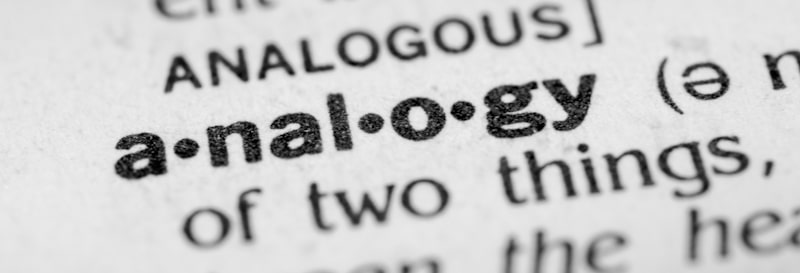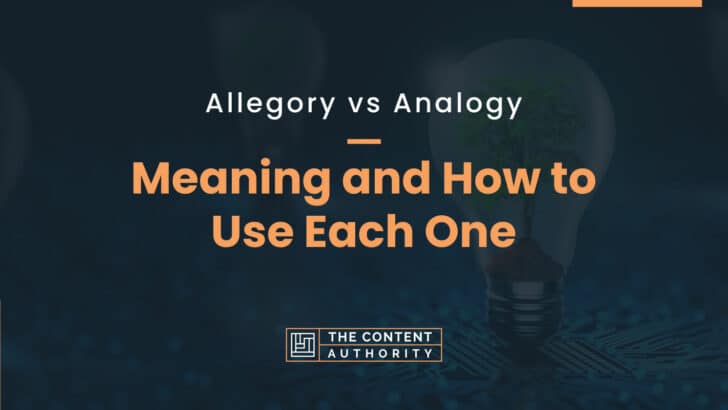Allegory vs analogy: how are these words related? The primary connection between these words is that they are rhyming words, meaning their last syllables have a similar sound when you pronounce them. So, are there more similarities and differences between these words?
Allegory means “the representation of abstract principles by characters or figures.” So, an allegory can be a book, picture, or form of communication with an abstract representation of principles. In contrast, an analogy is “a relationship of equivalence between two situations, things, or people.”
From their spellings, you can easily tell apart these words. However, there is more to these terms than meets the eye. So, read on as we focus more on the meanings and applications of these words, and you will be happy to find out more about these words.

Definitions Of Allegory And Analogy
Differentiating words with similar spellings is easy because all you have to do is point out their spelling differences. However, when it comes to words like “allegory” and “analogy,” telling their relationship is hard. It’s because you cannot differentiate words whose relationship you do not know.
Furthermore, you cannot tell the relationship between such words if you do not know their meanings. For this reason, we kick off this article by defining the words allegory and analogy.
Definitions Of Allegory
An allegory is a representation of an abstract principle using characters or figures. An abstract principle is a way of thinking or something based on general ideas instead of real objects, validity, or force.
So, an allegory represents a generalized idea using figures or characters. An example sentence is, “A fable or a story is the perfect example of an allegory.”
Another definition of allegory is “a picture, book, or any form of communication that represents abstract principles with characters and figures.” For example, “The allegory was not as interesting as advertised.”
Another reliable academic source defines allegory as “a symbolic representation with a hidden meaning that you can interpret.” The hidden meaning is usually a moral or political one.” An example sentence is, “The film created an allegory of society at the time of composition.”
In Mathematics, an allegory is “a category that recalls some of the edifices of the level of binary relationships between sets, showcasing a high-level generality in the specific category.” Here is an example sentence, “The mathematics teacher used a diagram to explain allegory categories in binary mathematical sets.”
Another meaning is “a figurative sentence where the principal subject is explained by another subject resembling it in its conditions and assets.” Therefore, the real subject in an allegory is usually not in view, and the readers have to collect the writer’s intentions through the resemblance of the major and minor subjects.
An example in a sentence is, “The play was an allegory of life and the state of the society.” In general contexts, you can refer to allegory as “anything that represents suggestive resemblance to something else.” For example, in a sentence, “The short story was an allegory of the leadership in America.”
Definitions Of Analogy
An analogy is “a relationship of resemblance between two people, objects, or circumstances.” So, an analogy serves as a basis for an explanation. Here is an example: “The analogy did not explain Mike’s answer as well as Kelly expected.”
Another definition of an analogy is “a resemblance of relations between things in some effects of situations when things are not really the same or entirely different.” An example sentence is, “Faridah used an analogy to explain the state of her relationship with Aaron.”
A simpler definition of an analogy is “a correspondence or partial similarity between two things or concepts.” For example, in a sentence, “She named her painting Monalisa because of its analogy to the famous artwork.”
In Linguistics, an analogy is “a process through which new words and inflections are created based on the regularities in the form of existing ones.”
How To Properly Use Allegory And Analogy In A Sentence
Telling the relationship between the words allegory and analogy is impossible if you have come across them for the first time. However, now that you understand their meanings, you can easily use each word in sentences. This section will help you sharpen up your sentence construction skills by featuring the words allegory and analogy.
How To Use The Word Allegory
Use this word as a noun in the two contexts:
- When referring to a narrative where the character delivers a broader or hidden message
- A symbolic representation with a hidden meaning
You can also use the plural form of allegory, “allegories.” For example, “The students were excited to learn about allegories in English class yesterday.”
How To Use The Word Analogy
Use this word as a noun when expressing a resemblance or equivalence between two people, objects, or situations. For example, “The play is an analogy of the state of the economy in Texas.”
Feel free to use the word as a noun in the following contexts:
- To refer to a direct or natural result or consequence
- A comprehensive explanation of an idea
- Having or bearing a relationship with something else
The plural form of “analogy” is “analogies.” Use it in a sentence like this: “The analogies are self-explanatory.”
Allegory vs Analogy: Two More Things To Know
The main connection between these words is that they are both figures of speech. English speakers use these words for comparisons or constructions not intended as literal truths but for understanding in a figurative sense. So, they are great tools for illustrating theories, ideas, or concepts, especially abstract ones. In fact, this is the source of their confusion.
However, their main difference is that an allegory is a more comprehensive literary word than an analogy. An allegory represents abstract ideas with characters. It also refers to a long narrative that uses a story to make a vivid lesson or a symbolic demonstration with a hidden meaning.
On the other hand, an analogy is more straightforward. It compares two things or a figure of speech expressing a symbolic construction. You can also view an allegory as an extended metaphor and an analogy as a comparison between two things.
List Of Examples Of Allegory And Analogy In Sentences
This post would not be complete without a section of example sentences. This section aims to show how you can construct sentences using these newly-learned words. Here are some examples of sentences featuring these words.
Example sentences of the word allegory
- How does the art teacher intend to transform this piece into an allegory for life?
- The readers failed to understand the allegory in the story.
- The allegory in the play is instantly recognizable.
- I was surprised when the audience did not understand the allegory for their society, people, and leadership.
- Expressing an allegory in a play is not an easy task.

Example sentences of the word analogy
- Juda tried to explain the events in the game with a weak athlete analogy.
- Our English teacher constantly used analogies in poetry lessons.
- The analogy in the advertisement by the democrats made me want to vote immediately.
- Faith loved to reason by analogy and references.
- We understood the concept when Simon presented an analogy to explain it further and more practically.
More Great Word Comparison Posts
Conclusion
You have probably used analogies and allegories without realizing what they are. However, now that you know them, you can start using these words confidently in conversations and writing. While doing so, do not forget to spell them correctly. So, what’s the key thing you have learned from this article?
Shawn Manaher is the founder and CEO of The Content Authority. He’s one part content manager, one part writing ninja organizer, and two parts leader of top content creators. You don’t even want to know what he calls pancakes.

